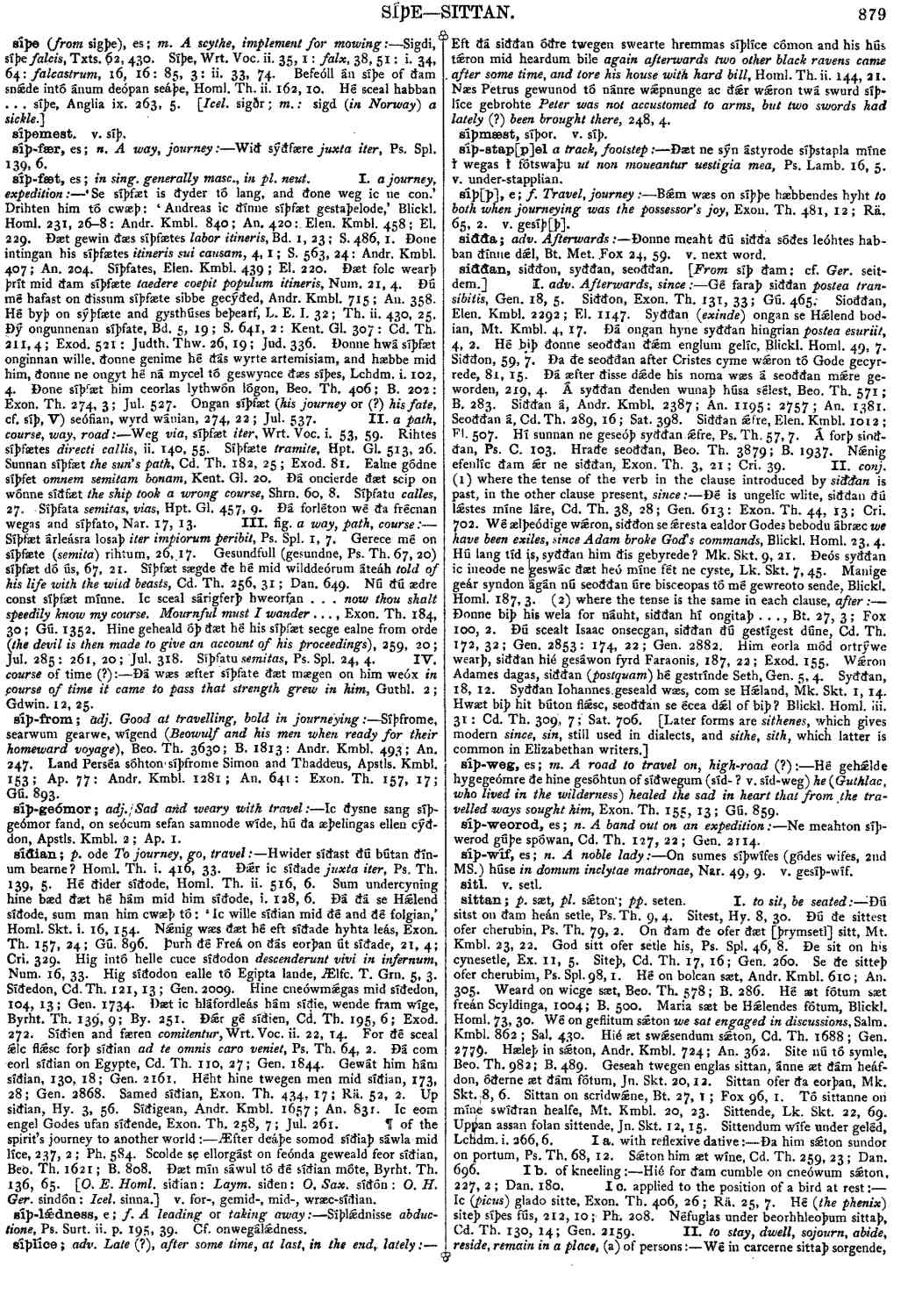siððan
- adverb
- conjunction
-
Gé faraþ siððan
postea transibitis,
- Gen. 18, 5.
-
Siððon,
- Exon. Th. 131, 33 ; Gú. 465.
-
Sioððan,
- Elen. Kmbl. 2292 ; El. 1147.
-
Syððan (
exinde
) ongan se Hǽlend bod*-*ian,- Mt. Kmbl. 4, 17.
-
Ðá ongan hyne syððan hingrian
postea esuriit,
- 4, 2.
-
Hé biþ ðonne seoððan ðǽm englum gelíc,
- Blickl. Homl. 49, 7.
-
Siððon,
- 59, 7.
-
Ða ðe seoððan after Cristes cyme wǽron tó Gode gecyr*-*rede,
- 81, 15.
-
Ðá æfter ðisse dǽde his noma wæs á seoððan mǽre ge*-*worden,
- 219, 4.
-
Á syððan ðenden wunaþ húsa sélest,
- Beo. Th. 571 ; B. 283.
-
Siððan á,
- Andr. Kmbl. 2387 ; An. 1195 : 2757 ; An. 1381.
-
Seoððan á,
- Cd. Th. 289, 16 ; Sat. 398.
-
Siððan ǽfre,
- Elen. Kmbl. 1012 ; El. 507.
-
Hí sunnan ne geseóþ syððan ǽfre,
- Ps. Th. 57, 7.
-
Á forþ sioð*-*ðan,
- Ps. C. 103.
-
Hraðe seoððan,
- Beo. Th. 3879 ; B. 1937.
-
Nǽnig efenlíc ðam ǽr ne siððan,
- Exon. Th. 3, 21 ; Cri. 39.
-
Ðé is ungelíc wlite, siððdan ðú lǽstes míne láre,
- Cd. Th. 38, 28 ; Gen. 613 : Exon. Th. 44, 13 ; Cri. 702.
-
Wé ælþeódige wǽron, siððon se ǽresta ealdor Godes bebodu ábræc
we have been exiles, since Adam broke God's commands,
- Blickl. Homl. 23, 4.
- Hú lang tíd is, syððan him ðis gebyrede ? Mk. Skt. 9, 21.
-
Ðeós syððan ic ineode ne geswác ðæt heó míne fét ne cyste,
- Lk. Skt. 7, 45.
-
Manige geár syndon ágán nú seoððan úre bisceopas tó mé gewreoto sende,
- Blickl. Homl. 187, 3.
-
Ðonne biþ his wela for náuht, siððan hí ongitaþ . . . ,
- Bt. 27, 3 ; 100, 2.
-
Ðú scealt Isaac onsecgan, siððan ðú gestígest dúne,
- Cd. Th. 172, 32 ; Gen. 2853 : 174, 22 ; Gen. 2882.
-
Him eorla mód ortrýwe wearþ, siððan hié gesáwon fyrd Faraonis,
- 187, 22 ; Exod. 155.
-
Wǽron Adames dagas, siððan (
postquam
) hé gestrínde- Seth, Gen. 5, 4.
-
Syððan,
- 18, 12.
-
Syððan Iohannes geseald wæs, com se Hǽland,
- Mk. Skt. 1, 14.
- Hwæt biþ hit búton flǽsc, seoððan se écea dǽl of biþ ? Blickl. Homl. iii. 31 : Cd. Th. 309, 7 ; Sat. 706.
Bosworth, Joseph. “siððan.” In An Anglo-Saxon Dictionary Online, edited by Thomas Northcote Toller, Christ Sean, and Ondřej Tichy. Prague: Faculty of Arts, Charles University, 2014. https://bosworthtoller.com/27885.
Checked: 0